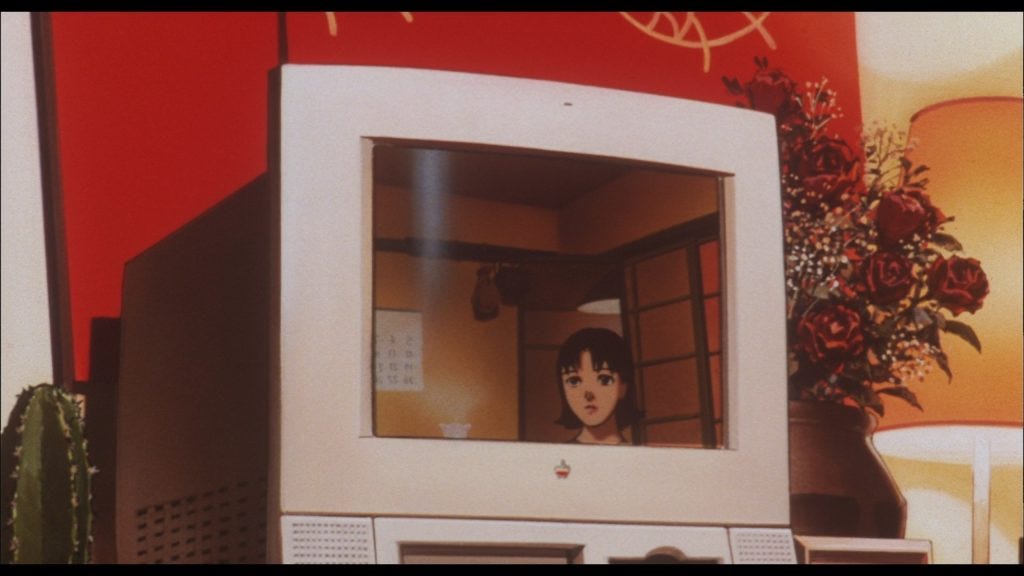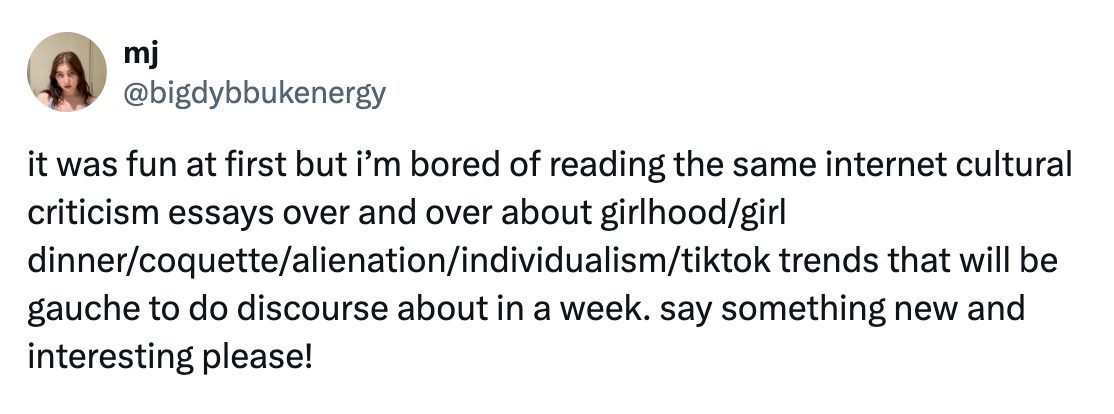౨ৎ Girl blog
On the personal essay
🎀 MENTIONED: Jia Tolentino’s “The Personal Essay Boom is Over”; Laura Bennett’s “The First Person Industrial Complex”; Merve Emre’s “Two Paths for the Personal Essay”; Vivian Gornick’s The Situation and The Story; Emily Gould’s “The Lure of Divorce”; Lauren Oyler on Jia Tolentino; Biz Sherbert on girlbloggers, Emmeline Clein’s Dead Weight.
It was a big week for personal essays, specifically personal essays published by The Cut. For awhile, the personal essay was rumored to be dead in the rotting ditch of mid-2010s blog culture, felled by the profit-driven corporatization of digital media. Here, cause was mistaken for effect. When the first-generation blogs (xoJane, Gawker, The Awl, Buzzfeed Ideas) that fed the “first person industrial complex” shuttered, their failures were chalked up to a matter of strategy. The personal essay, by affiliation, was deemed passé, a relic of an optimistic period of online publishing. In pursuit of eternal virality, digital media sites pivoted from opinionated screeds to short-form video, podcasts, and clickbait-y listicles.
But the essay as a literary form has long preceded the internet. So has the debate over the aesthetic metrics of a good essay. Merve Emre cites Virginia Woolf’s 1905 screed “The Decay of Essay Writing,” where Woolf bemoans the “amazing and unclothed egoism” of a new class of writers. “If one can set aside [Woolf’s] disdain, there is a larger point,” Emre writes. “Too many people writing have nothing interesting to say and no interesting way in which to say it.”
In the beginning, the internet was made up mostly of words: message boards and discussion forums and blogs. When the personal essay, “a form without a form,” became adapted for the blogosphere, the form became popularized for its casual approach to personal testimony. The number of people writing who had nothing interesting to say drastically increased. (Tolentino: “The Internet made the personal essay worse, as it does for most things. But I am moved by the negotiation of vulnerability.”) But readers seem to care little about whether today’s writers have anything interesting or original to say, never mind the style or quality of their prose and argument. We read what’s popular, right (ideologically), or good (morally), and the righteous and the good are often conflated.
Some time during the blog boom, style was flattened into content, reducing the essay to a confabulatory, confessional mode of online writing. Content that was gendered and gossip-laden and cheap to produce. Content that was, ironically, essential to generating page-views to boost advertising sales. Suppose it’s a systemic issue then. Content is a byproduct of our saturated information landscape. There’s too much stuff to watch and read, we exist in echo chambers, etc etc. Remember, content is one-dimensional. It traffics in the explicit, the easily interpretable. Content has a message. It explains things to us and leaves no room for ambiguity. Content, like fast fashion or fast food, is cheaply made and quickly ingested. We forget the titillating details; we want more of it.
Content doesn’t change us. It doesn’t want us to think.
While the essay is not a mode of direct address (writers are not explicitly referring to the audience within the text), the viral pieces that evolve into discourse become mirrors to measure how one feels about the subject matter at hand. We’ve fixated overwhelmingly on an essay’s message, in lieu of a substantive style.
In the era of Lived Experience, readers hungered after the plate of personal truths presented in the essay, no matter how outrageous or enraging or navel-gazey. Some of us (mostly women) found ourselves relating to these essayists (mostly white women). We thought them to be good, well-meaning people, and so we thought their essays, the medium by which they delivered their message, must also be good. That is, until they proved themselves to be narrow-minded or problematic, which made their work, by default, bad. As reader-voyeurs, our judgments are muddied by our preoccupation with the writer. Rather than assessing her on a level of style or craft, her relevance is determined by her message, her perceived moral value. Publication, in turn, becomes validation, a condition of acknowledgement that one’s story is worth telling or, worse, right or good.
Emre summarized it best: “For a certain breed of personal essayist at work today, there exists a necessary and desirable trade-off between aesthetic clarity and moral complexity; a bargain premised on the depressing notion that words are always insufficient to the task at hand and so we may as well stop trying to choose the clearest or most precise ones.”
When a writer becomes preoccupied with self-presentation (coming off the right way to the reader), the writing becomes needlessly self-reflexive. Criticism, too, suffers from this, argues Lauren Oyler in 2019: “Hysterical critics are self-centered — not because they write about themselves, which writers have always done, but because they can make any observation about the world lead back to their own lives and feelings, though it should be the other way round.”
I have a hard time trusting writers who aren’t ambivalent about their “I.” Fiction writers, I trust. It’s the essayists and memoirists and non-fictionists who engage in “life writing” — I’m implicating myself here — that I am most skeptical of. Because it’s never the same “I” every time. If you don’t believe me, open your Notes app or an old journal. Flip to an entry dated six months ago. Was it the same you who wrote that? Every time I sit down to write, the “I” that emerges sounds different. The more I write in the first person, the more I become convinced that I’m producing a piece of fiction based on fact.
We’ve been through this before, death of the author, Nietzsche, Rosseau. From “Dear John,” a piece of fictional criticism I read recently at an event hosted by No Bells, a music blog: “I have since disavowed that blonde and bloated version of my “self,” though I must confess that I do not believe in a fixed self; I only believe in the “I” on the page, privy and pliant to my revisionist instincts.”
On memoiristic writing, I am of the belief that, to quote Vivian Gornick quoting VS Pritchett, “It’s all in the art. You get no credit for living.” So I was not convinced by the depth of personal inquiry in Emily Gould’s “The Lure of Divorce,” due primarily to its dissociative tone. The essay begins: “In the summer of 2022, I lost my mind.” There is a lot of chronicling of what happened, but not enough rigorous introspection into the why — perhaps because the writer is, as she admitted, on “strong antipsychotic medication” and is not quite removed from her situation. She and her husband entered divorce mediation in December.
Gould is the defining essayist of the blog era; she is a master at revealing just enough to stir our interests and keep us reading. She admitted to spending “money like it was water,” her decline into alcoholism, and a one-time affair at “a yoga retreat center” she’s presumably banned from. But the details of these events are skirted over for mere exposition. She was hospitalized, she got on meds, she began contemplating divorce, she read about divorce, they opted to do couples therapy instead. I don’t care about the morals of Gould’s situation, but the story felt incomplete and therefore… dishonest: This woman was clearly wretched and angry and distressed by the circumstances of her marriage.
There’s no need to read between the lines to register her resentment (“My husband would have to forgive me for cheating and wasting our money. I would have to forgive him for treading on my literary territory: our family’s life, my own life.”) But as a reader, I was frustrated by how these feelings rarely penetrated through to the prose. They were simply recited, almost like symptoms in Gould’s diagnosis of her unhappy predicament. (“I wondered if my marriage would always feel like a competition and if the only way to call the competition a draw would be to end it.”) Perhaps the essay should’ve been written in 2028, a married friend contending with the seven-year itch texted me.
Gornick, again: “Truth in a memoir is achieved not through a recital of actual events; it is achieved when the reader comes to believe that the writer is working hard to engage with the experience at hand.”
I have a theory about where the essay has headed.
In the late-2000s and early-2010s, when the personal essay was retrofitted for the blogosphere as content, it produced a generation of very online writers (millennials) who were adept at chronicling the minutiae of their lives for public consumption. Most of these essay-blogs were written quickly and, as a result, rooted in shallow self-examination. The tone was declarative and opinionated. This is how I feel. This is what happened to me. This is what I think.
Some time in the mid-2010s, with the advent of social media, image displaced text as the defining mode of the blogosphere. After LiveJournal, Xanga, and Blogspot came Tumblr, where users cultivated a persona, a voice, a visual identity through images. The essay has since been remixed, molded into a revised form by a younger generation of bloggers, mostly young girls, who experience the internet as an infinite landscape of images.
Whereas the “hysterical” (millennial) essayist assesses the world through the prism/prison of self, utilizing personal experience to substantiate their claims (Oyler: “Writing is a way to figure out what she thinks and to become a better person”), this new breed of very online writers, the girlblogger, is intrinsically skeptical of her self, her opinions. Nymphet Alumni’s Biz Sherbert defines the girlblogger as “a girl who blogs about being a girl, a girl’s girl, a girly girl who looks like she dances ballet, weighs little, wears lip products from Dior, and is tightly wound but loosely tied together with silk ribbon,” but I employ girlblogger as more of a catch-all term. The girlblogger is a Zoomer, who is keenly aware of the performance, the aesthetics of writing. She is made up of surfaces, her identity a collage of resonant images and quotations.
I wonder if this is an overcorrection, an implicit rejection of a mode popularized by her forebears. Here the “I” is a spectral presence, a liability; lived experience is disclosed with the awareness of its limitations. Emmeline Clein, debut author of the essay collection Dead Weight, describes her book as “a choral narrative, one that could not exist without the words of other girls, other people in pain.”
Many young writers I read/skim on Substack seek out sources external to themselves — art, film, theory — to make sense of the world. They drink the tap water of the zeitgeist to get a sense of how to respond. Perhaps this, too, is a liability — the inability to commit to an argument, opting instead to read between the lines of other people’s arguments. Can I read through an essay without a laundry list of citations?
But it makes sense why the Tumblr generation would define themselves in relation to external media, to collective/shared narratives. When you grow up on the internet, the possibility of an original thought, an original take, feels impossible. Your age, at once fixed and ever-changing. The possibility of confronting adulthood on the platforms that you once loitered on, as a girl-child, feels foreign and strange. My Tumblr beckons me to inert nostalgia. My inner girlblogger knows that writing is posting is posturing a persona before a hall of two-way mirrors.





Wonderful essay. I'd say — and you nod to this with re: "[preoccupation] with self-presentation — that the panopticon of social media that many millennials fear/obsess over also becomes this consistent source of delocated feedback. I find myself thinking of what the reaction and what the reaction to the reaction (and so forth) will be in writing something personal, and eventually that cycle occludes any sort of insight. I think Oyler hit on something in that 2019 essay. Personal essays do have to descend into solipsism at some point, but they also need to emerge from it and a lot of modern essays can't seem to nail that second part.
Great essay. I also take issue with the flattening of language and ideas, as well as these umbrella phrases that people hide under (e.g., "main character energy," "it's the details") to avoid interrogating their own inner worlds. But I also think that our brains, after decades of internet, tend to operate with hyperlinks; referencing others can support original thinking, when it's linking as sampling or giving credit.